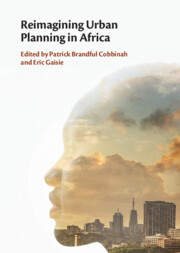Book contents
- Reimagining Urban Planning in Africa
- Reimagining Urban Planning in Africa
- Copyright page
- Contents
- Contributors
- Foreword
- Preface
- Acknowledgements
- Abbreviations
- Part I Understanding Sustainable Urban Planning in Africa
- 1 Reimagining African Cities
- 2 Annals of Urban Planning in Africa
- 3 New Cities in Africa and the Reimagination of Urban Planning
- 4 Informal Settlements and Pro-poor Urban Planning in African Cities
- 5 Urban Planning and Sustainable Land Governance in Africa
- 6 Urban Planning and Climate Change Action in Africa
- Part II Case Studies on Urban Planning in African Countries
- Part III Sustainable Urban Planning in Africa
- Index
- References
5 - Urban Planning and Sustainable Land Governance in Africa
Dialectics and Dialogues
from Part I - Understanding Sustainable Urban Planning in Africa
Published online by Cambridge University Press: 07 December 2023
- Reimagining Urban Planning in Africa
- Reimagining Urban Planning in Africa
- Copyright page
- Contents
- Contributors
- Foreword
- Preface
- Acknowledgements
- Abbreviations
- Part I Understanding Sustainable Urban Planning in Africa
- 1 Reimagining African Cities
- 2 Annals of Urban Planning in Africa
- 3 New Cities in Africa and the Reimagination of Urban Planning
- 4 Informal Settlements and Pro-poor Urban Planning in African Cities
- 5 Urban Planning and Sustainable Land Governance in Africa
- 6 Urban Planning and Climate Change Action in Africa
- Part II Case Studies on Urban Planning in African Countries
- Part III Sustainable Urban Planning in Africa
- Index
- References
Summary
A problem in the African urban development system is that the authorities have not always listened to the people. This chapter shows that dialogues between urban-dwelling people can serve as sources of ideas for city authorities and policymakers towards solving land and planning problems. It uses dialectics and dialogic enquiries to evoke the voices of people in African cities through short dialogues that reflect critical questions concerning urban planning and sustainable land governance. These brief dialogues constitute a walk-through of the texts that laid out a diverse set of statements probing the urban prognosis of five cities – Addis Ababa, Cairo, Kinshasa, Lagos and Windhoek – from five regions of Africa. Explicit and implicit scenarios within the dialogues present the inherent challenges in Africa’s urban land situation. The chapter concludes that the reimaging of African cities should be part of a reimagining process in urban planning.
- Type
- Chapter
- Information
- Reimagining Urban Planning in Africa , pp. 70 - 83Publisher: Cambridge University PressPrint publication year: 2023

